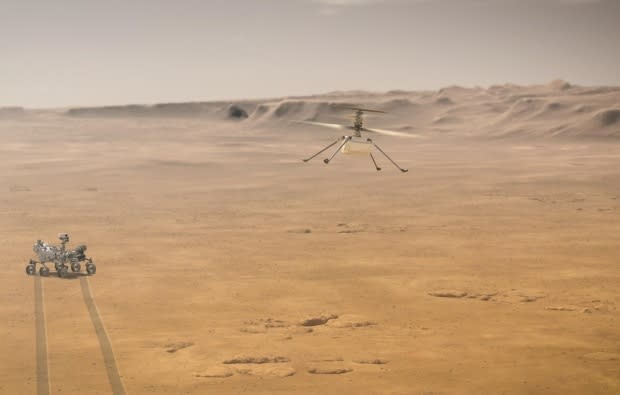Island-born scientist names section of Mars crater after P.E.I. National Park
A scientist from P.E.I. who now works with NASA's Jet Propulsion Laboratories in California had a hand in naming a section of alien land, as part of his role in the Mars 2020 Perseverance rover mission, and went with a name from his home province: Prince Edward Island National Park.
Peter Willis is one of the investigative scientists for the rover's SuperCam instrument, which will enable the rover in its mission to collect ground samples from Mars in the search for signs of past life on the Red Planet.
Well before the launch of the rover, happening Thursday in Cape Canaveral, Fla., scientists had to map a section on Mars known as the Jezero Crater in order to prepare for the possibility that the rover may drive through it. The crater was parcelled out, and the science team was allowed to submit naming suggestions for each section.
Willis said the plan was to name each square of land after a national park, from anywhere in the world. So, the Islander went with Prince Edward Island National Park.

"I even gave some rationale. Most people just put down and said 'I like this park,' but you know Prince Edward Island actually has some quite similar mineralogical aspects to Mars," Willis said.
"All the bright red clay, there's those materials actually in place in the Jezero Crater and all over Mars, so people really like it and picked it immediately."
The Perseverance's travels will depend on where it lands next year, but Willis said there is always a chance it could travel through the section of land named for P.E.I.
"If we did drive through it, then that would be really cool because I'm presuming, and none of this is set in stone, but I'm presuming that we could get to pick a bunch of names from P.E.I. for the different things inside the quadrant," he said.
Willis said this project is the most involved he's been in a rover mission, but he's disappointed that he won't get to be at the launch site, due to the ongoing COVID-19 pandemic.
"We're quite disappointed because we were going to be in Florida. I actually had never participated in a launch before — I wasn't going to go to a launch until I worked on something and I made a substantial contribution myself, so this would have been my first in-person launch in Cape Canaveral," Willis said.
"We were going to have the family and a whole bunch of folks from P.E.I. come down for it, but they closed it all off for of course the health concerns, so now everything's moved to a virtual format. But you know, we're going to make the best of it and we feel the less of the connection with other people over this, we really had wished we could have been there."
Instead, Willis and his family will have some friends over to their home to watch the launch on a projector.

While the rover isn't expected to land on Mars until February 2021, Willis said there is still a lot of work to be done — especially if the COVID-19 pandemic means people working remotely.
Staff will be running simulations and scenarios to figure out what, exactly, the rover will do when it lands.
"There's all sorts of different software tools that are, quite frankly, not finished yet, so we have to finish all the software tools and practice using them and get everybody trained, and there's hundreds of people who are going to participate in the operation," Willis said.
"And then on top of it we have to plan for the fact that we may be doing all of this — it's very reasonable to assume that we're going to be doing almost all of the operations remotely, which is going to be a first for us."
More from CBC P.E.I.


